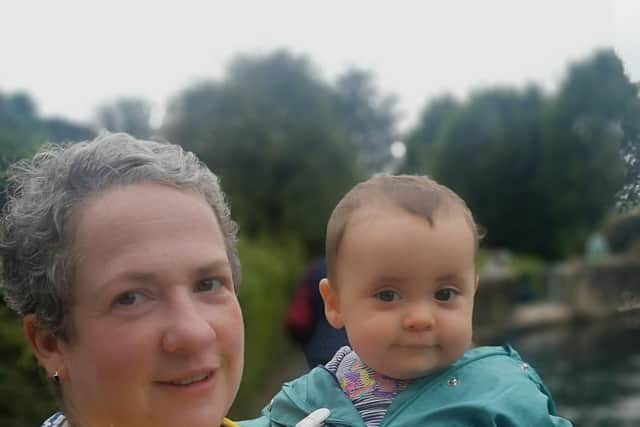The Londonderry woman who had breast cancer whilst pregnant during the pandemic
and live on Freeview channel 276
Yvonne Doran, 39, said: “I felt a lump in my breast in July 2020 and I put off contacting the GP for a couple of weeks because I thought it would be difficult getting an appointment due to COVID.
"They referred me to the local breast clinic and because of the restrictions, I was alone when I was told the news.
Advertisement
Hide AdAdvertisement
Hide Ad“The first thing I asked was if the baby was okay and then for the survival rates.


"I was sitting there crying, thinking I was about to have my first baby and I might not even be here for her. That was one of the hardest days.”
Yvonne added: “I had to have a lot of my ante-natal care and cancer treatment alone which was very upsetting at times, but I know that I was more fortunate than some women who had their diagnosis delayed, or treatment interrupted.”
Yvonne, whose daughter Maggie is now two, is sharing her experience of the with scientists from Queen’s University as part of a new research project funded by Breast Cancer Now.
Advertisement
Hide AdAdvertisement
Hide AdThe charity has awarded £229,000 to a team led by Professor Anna Gavin at QUB to assess the impact of the COVID-19 pandemic on the diagnosis and treatment of breast cancer with the aim of improving care.
The two-part study will see researchers analyse the anonymised data of more than 2,000 people in Northern Ireland who were diagnosed with breast cancer between April and December 2020 (the first lockdowns) or in 2018 (the last full year in which patients will have completed their treatment before the pandemic). They will examine whether there are differences in how quickly they were diagnosed, how advanced the cancer was and the type of treatment they received.
And to ensure the voices of patients are central to the research, women and men living with breast cancer during the pandemic from across the UK and Ireland will be invited to take part in an online survey next year.
Yvonne said: “Research like this is so important to understand how patients like me were affected by the pandemic and help ensure our experiences are learnt from.”
Advertisement
Hide AdAdvertisement
Hide AdThe Belfast team’s research will build on existing evidence to provide further insight about how the pandemic has affected cancer care.
The breast cancer screening programmes in Northern Ireland, as well as England, Scotland and Wales were suspended for several months in 2020 and operated at a reduced capacity when they re-opened.
The most recent cancer waiting times data for Northern Ireland, shows that key targets around the diagnosis and treatment of breast cancer are still being missed as clinical services recover.
In June 2022, just 58 per cent of people with an urgent GP referral for suspected breast cancer saw a specialist within two weeks - a target that should be met by all patients. In the same period, only 83 per cent of people started breast cancer treatment within 62 days of referral – compared with a target of 95 per cent.
Advertisement
Hide AdAdvertisement
Hide AdProfessor Gavin said: “Our research will shine a light on the unique challenges specifically faced by thousands of breast cancer patients in Northern Ireland during the pandemic and the first COVID-19 lockdowns.
" By also drawing on the experiences of women and men across the UK and Ireland we’ll ensure the voice of the wider patient community is at the heart of our work.
“It’s vital we understand the longer-term impact of the service disruption on people with breast cancer so positive changes can be made for the future and it’s thanks to Breast Cancer Now we’re able to do this.”
When the pandemic hit, Breast Cancer Now was concerned about how it would impact its ability to support research but, thanks to the incredible generosity of its supporters, the charity is funding 11 new research projects in 2022.
Advertisement
Hide AdAdvertisement
Hide AdDr Simon Vincent, Breast Cancer Now’s director of Research, Support and Influencing said: “Waiting for a breast cancer diagnosis and beginning treatment are challenging experiences at any time.
"We already know that people faced delays and additional burdens because of the pandemic but it’s important we understand its full impact.
“Building an accurate and detailed picture of the scale of the disruption and how this affected individual patients will help policymakers, the health and social care system and organisations such as Breast Cancer Now continue to shape their future work.
“The research will also reveal key lessons for the management of any future health emergency so we can minimise service disruption and the additional anxiety this causes patients.”
Advertisement
Hide AdAdvertisement
Hide AdThe Breast Cancer Now website will be updated with further information about the survey and how to contribute, once it is live.